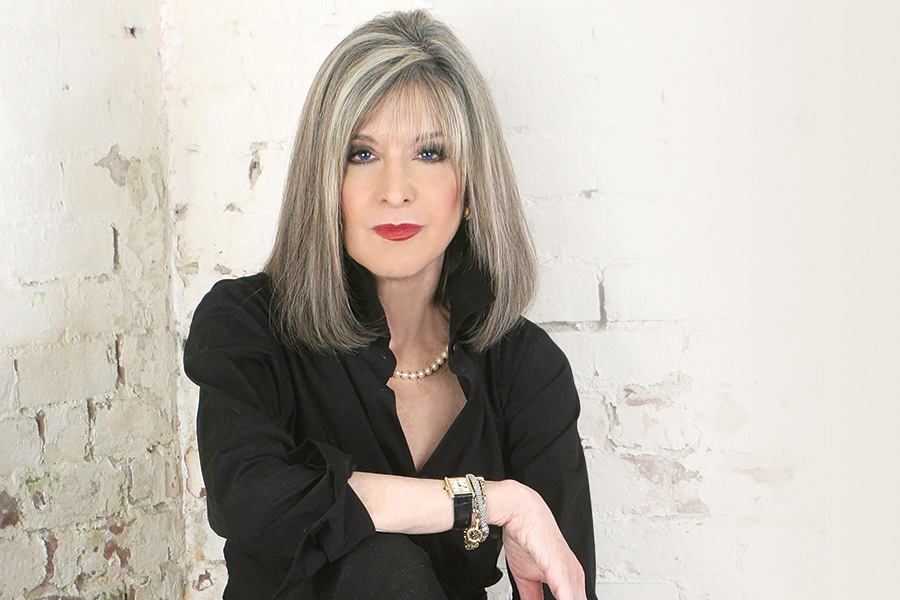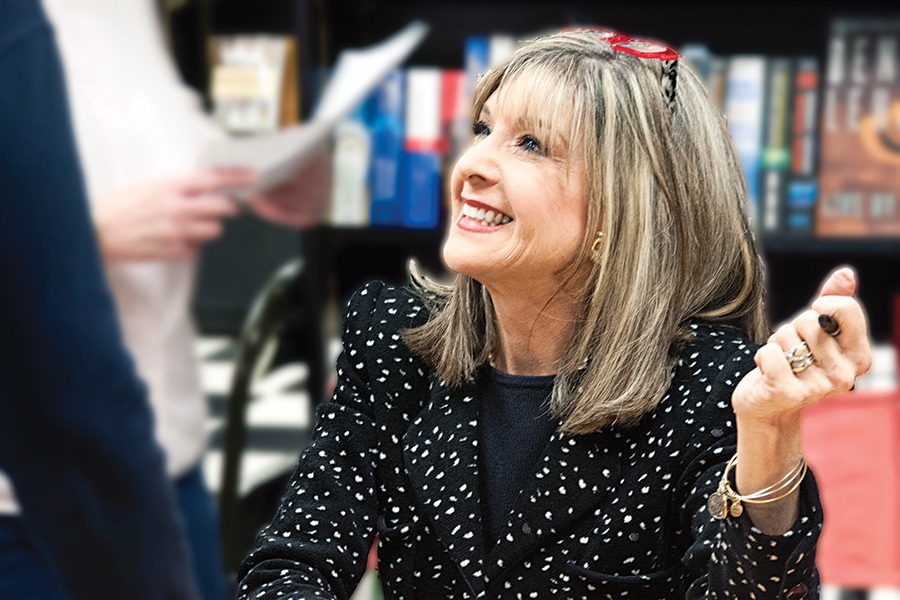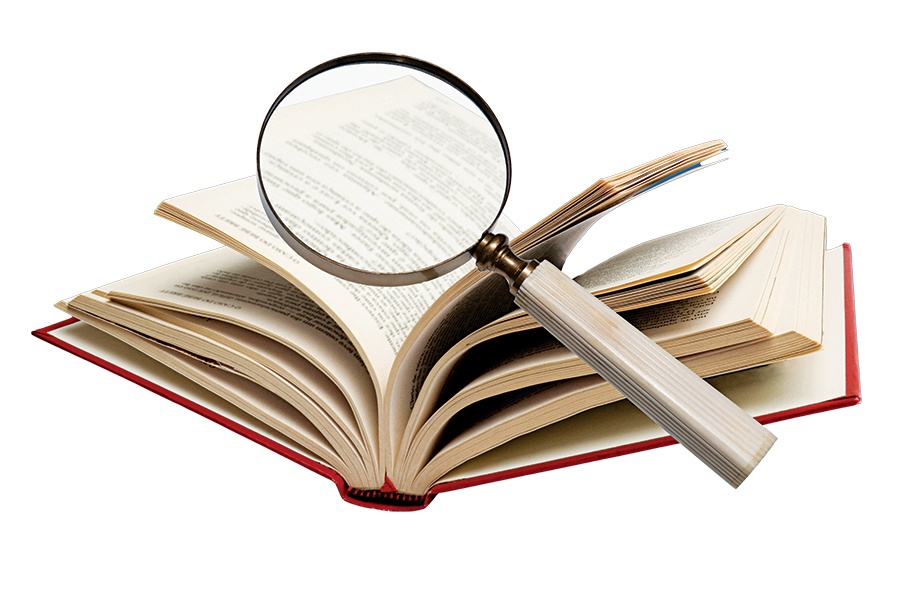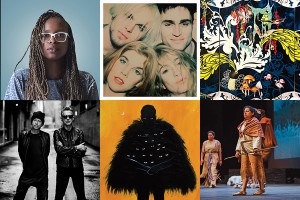The Interview: Novelist Hank Phillippi Ryan
Celebrating the release of her latest psychological thriller, the prolific hometown author talks writing, Nancy Drew, and getting away (or not) with murder.

Photo by Lynn Wayne
Hank Phillippi Ryan has a confession to make: She’s tried to get away with murder 14 times so far. Mind you, she’s not talking literally: As a bestselling author, Ryan spins thrillers packed with mystery and suspense until the very last page. And she has an impressive collection of literary awards to show for it: five Agathas, five Anthonys, and the coveted Mary Higgins Clark. This month, the author—who’s also a veteran investigative reporter for WHDH—debuts her newest (and 15th!) novel, The House Guest, about a friendship between two women that isn’t what it seems. We sat down with her to talk about her latest book, plus Nancy Drew, the Gardner heist, and how she ended up with the name Hank.
First of all, what is the genesis of your name? Hank, I know, is not your given name.
I can’t believe you’re getting me to tell you this. My birth name is Harriet. And when you’re a geeky, nerdy 14-year-old, and all the cool girls are Debbie and Linda, you do not want to be Harriet. On my first day of college, someone saw my computer entry card and said, “You don’t look like a Harriet. We’ll call you Hank.” That was in 1967, and I don’t remember who that was. But I remember saying, “Great, wonderful—anything but Harriet.” I’ve been Hank ever since. I love the name Harriet now. I wish I had kept it. I argued with my mother over that name until literally the day she died, when I apologized for it and said, “Mom, you were so right.” And she said, “You were such a difficult child.”
Were you a Nancy Drew fan when you were growing up?
I devoured Nancy Drew. My sister and I used to ride our ponies to the library. And we would fill up the saddlebags with books, often Nancy Drew to begin with, and read up in the hayloft of the barn behind our house. I loved Nancy Drew—she was smart, she was in control, and she could figure things out. And she had a cool housekeeper and a dad who loved her. I thought she was great. I loved the mysteries of those novels. I’m really grateful to that series for introducing me to empowered women. And the power of a mystery.
Who is your favorite detective in fiction?
You heard me just take a breath and have to think about that. Because that is an impossible question. I could start with Sherlock Holmes. I would not be here if not for having read all of the Sherlock Holmes short stories and novellas when I was a kid. Dorothy Sayers’s characters, Harriet Vane and Lord Peter Wimsey. They’re so urbane and elegant and smart. Sue Grafton’s Kinsey Millhone—talk about a powerful woman who took control of her own life. I know Inspector Morse is dour and cranky, but he’s so brilliant. You have to love Hercule Poirot, but he’s not very likable. And Miss Marple. But she was very, very nosy.
Do you consider yourself a nosy person?
I’m the most curious person there ever could be. You know, that’s a good thing for a reporter and a good thing for a mystery author. But nosy, I wouldn’t say so. I know the line.
In addition to writing prolifically, you also have your investigative journalist job. How the hell do you do it all?
The only thing worse than having an impossibly long to-do list is having a to-do list that’s blank. So I just embrace it and take one step at a time and count my blessings every day for how lucky I am.
What is the biggest mystery in your life?
What is the end of my new novel, The House Guest? I have no idea. I just type chapter one and start going. And inevitably, eventually, I get to chapter 60 or so, where I am right now. The book is due January 17. And so that is just the drumbeat in the back of my head constantly.
So the whole story doesn’t come to you all at once?
It doesn’t. I start with a gem of a good idea. And I type chapter one. And I think, Okay, let’s see what happens. If I knew the ending, it wouldn’t be a good story. That’s one of the joys of being a writer. A surprise is part of the process, and I embrace it.
Do you ever use real people as the basis for characters in your books?
I do not. Okay, well, I used my mother once cleverly disguised, but it only took her about four seconds to figure it out. And I never heard the end of it. So my people are not real people. Nor are they even composites of people. They are purely fictional.
So you didn’t base Charlotte McNally or Jane Ryland on yourself?
Again, you hear the silence. It’s impossible to write a novel without having some of yourself in it in some way. I have been a reporter for 43 years. I’ve wired myself with hidden cameras and gone undercover and in disguise to confront corrupt politicians and chase down criminals. So it would be silly for me not to take that kind of experience and use that to make my books feel authentic and genuine. But neither Jane Ryland nor Charlotte McNally is me. Not at all.
Are you ever inspired by real crimes?
Sure. My husband is a criminal defense attorney. And you know, our dinner-table conversations are pretty interesting with who we both are. But I don’t take his cases and fictionalize them, and I don’t take my news stories and fictionalize them in my books. But I do take inspiration from real life.
Do you think you could get away with murder?
They always catch you. I really think they always catch you. I’ve tried to get away with murder 14 times now. And working on number 15. And they always catch you.
How much do you know or study police procedure?
I don’t study it. But after so many years as a reporter, I’ve been deeply involved in it. So I feel that I’m savvy enough about the process to be able to write with some degree of authenticity about it. And if I have questions, I have plenty of people to ask.
Is being an investigative journalist like being a detective?
Whether you’re a detective, an investigative reporter, or a crime-fiction writer, telling a story is the same. You have a character you care about and a problem that needs to be solved. You track down clues and follow leads and do research. You want the good guys to win and the bad guys to get what’s coming to them, and in the end, you want justice, and you want to change the world a bit. That’s what I’ve tried to do every time, whether in fact or in fiction.
Do you have a writing routine?
I don’t have any rituals because I’m always afraid that if I create a ritual and then, for some reason, I can’t do it, then I won’t be able to write. So I look at writing as a profession, as a responsibility. And in every job, the key is to keep the boss happy. And I’m the boss. The thing that makes me the happiest is when I get my words for the day done. Whether it takes five hours or whether it takes 30 minutes, I try to write 1,000 words a day.
Do you binge any of the crime-TV shows?
I will admit to binging Breaking Bad, Better Call Saul, and Line of Duty, which is a British police procedural. Magpie Murders is fantastic. It’s funny because I want to try to solve the mysteries before the solution is revealed. And I’ll yell at the television, “It’s the sister! Someone’s gonna drown!” My husband says, “Honey, can’t you just watch them without guessing?” And I say, “No, I can’t.”

Photo by Steve Bucci
What’s your favorite local bookstore?
Well, my launch party is at Brookline Booksmith. They have hosted every one of my launch parties, and this year is no different. It’s on February 7 at 7 p.m., and you’re all invited! Oh, and An Unlikely Story in Plainville. It’s owned by the author of the Diary of a Wimpy Kid series, and the store and everyone in it is absolutely magical.
Is there a place in Boston where you always take out-of-town guests?
Oh, golly, there are a lot. We go to the waterfront and look out over the harbor. Boston Common is historic. I’ve put it in so many of my books.
Do you think the Isabella Stewart Gardner Museum heist will be solved?
I have to think they’ll figure it out. There’s got to be someone who knows something who will tell it. It’s so riveting because it seemed like it was so easy to do. And afterward, how could you possibly hide those paintings? And why would someone do it? I mean, the commission of the crime and the motive for the crime and the cover-up of the crime—each of those things is fascinating.
Do you have a favorite hangout spot in Boston?
I’ve been home for the past three years. I don’t even know what’s out there anymore.
Is there a mystery in real life that you wish you had solved?
You know, one of the things that’s haunted me since it happened is the disappearance of an anchorperson in Iowa, Jodi Huisentruit. She was a beloved reporter, and they never found what happened to her as far as I know. I wish I could figure out what happened to her. I mean, that’s really what my book, Her Perfect Life, is kind of about: the vulnerability of being in the public spotlight and how the spotlight might be the most dangerous place of all.
Why do you think so many mystery writers give such detail about what the detective or the main characters eat?
Do they? That’s a truly interesting observation. If they do, I can give you a little bit of a writerly answer. And that would be that one of the elements of creating a character who is realistic, relatable, likable, and more than just their job is to give them a real life—that they have pets or a hobby, or that they actually eat. And lots of readers love to read about food. It’s engaging, and it makes a connection. So if you think, Oh, you know, Kinsey Millhone likes peanut-butter-and-pickle sandwiches, and so do I, then you’re connected with the character.
Are you a good cook?
I am a good cook. I love to cook. I think it’s the same kind of process as writing: You have a good idea, and then you get to work on it and see if it comes out the way you thought. And then you get to share it with someone else and see whether they love it as well.
Is there a convention of mystery writing that you avoid?
I don’t like serial killers. And I have read books that I think are great that include serial killers, but I don’t write them. My books are psychological suspense, which is about the damage people do to one another emotionally and psychologically. I think the mind is a great weapon.

Getty Composite Image (Book photo: Luis Portugal; Magnifying glass photo: Miragec)
By the Numbers
Whodunit?
Boston has had its fair share of successful mystery writers, including the very first one.
1841
Year Boston native Edgar Allan Poe published The Murders in the Rue Morgue, considered the first modern detective story.
70
Number of books written by Cambridge’s Robert B. Parker, including his famous Spenser series.
0
Number of books Massachusetts resident Patricia Cornwell sold at her first book signing. She has since sold 100 million copies of her books.
4
Number of novels written by Dorchester native Dennis Lehane that have been adapted into films.
257
Weeks Cambridge author Karen M. McManus’s YA mystery novel One of Us Is Lying had been on the New York Times bestseller list at presstime.
First published in the print version of the February 2023 issue with the headline, “Woman of Mystery.”
Previously
- The Interview: GBH President and CEO Susan Goldberg
- The Interview: MIT President Sally Kornbluth
- The Interview: Boston Public Schools Superintendent Mary Skipper
- The Interview: Boston Public Library President David Leonard
- The Interview: CNN Anchor and Correspondent Audie Cornish
- The Interview: Joey McIntyre of New Kids on the Block

